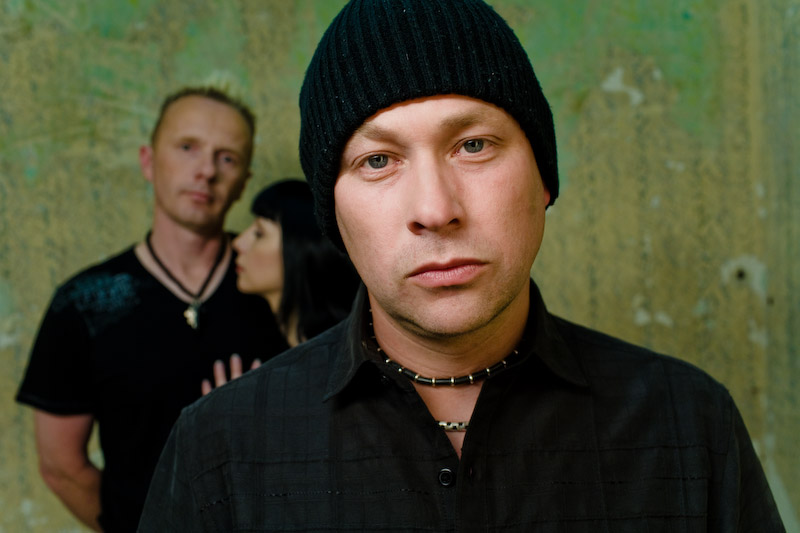LE: Hello there. The release of your new album (A Perfect Solution) is among the best news we’ve heard within the current year. Tell us please how you feel about this release. Comparing this work to your previous ones, what elements exactly do you feel were different in the process of composing it?
Its always a good feeling when you release an album. It is a sense of closure on something that you have been working on for such a long time. As much as we all love writing albums it is great to finish it. Then there is the anxiety waiting for the reaction and feedback of people. It is a rollercoaster ride of emotions.
There is no strategic plan when we start writing a new album, we generally start writing and see what develops. After a few songs thing start taking shape and go in a certain direction. With “A Perfect Solution” there is more of a feeling of energy and emotion than on previous albums. To me “We Collide” was more commercial sounding album than this one, I feel we are back in our comfort zone doing what we do best.
The writing and recording process is pretty much the same as before but maybe our frame of mind was different this time. There was no pressure from any outside sources such as record companies. We just wrote from the heart and put together an uncompromising piece of work.
LE: A lot of people keep saying that the underground electronic music scene (and especially the so called melodic “synthpop” scene) seems to be more shrunk than ever, and the glorious days of the recent past (1995 – 2005) are over (at least regarding electro/synthpop as a lot of bands of this scene either have stopped releasing albums or have been working on other projects with “noisier” and more industrial sound). What is your opinion about that and which do you think were the reasons for such a decay of the specific scene?
We have never really seen ourselves as synthpop. To me that term conjures up a very light weight pop song using synthesizers which is definitely not what we are about. We see ourselves as more of an alternative band that happened to use a lot of electronic element to create our music.
I think the decline has come about from there being far too many average bands putting out average music and people have become bored. That said the same can be said for the more industrial/ebm bands, to me the scene is suffering from people imitating each other and following a formula for every song. There seems to be a lack of creativity. There will always be a scene for this kind of music but longevity isn’t achieved by everybody copying each other.
LE: How much and in which way has the departure of Neil Taylor affected you as a group;
His departure only affected us on a personal level. When he decided to leave I think Mark and I felt let down by his decision. We were in the early part of the promotion of “We Collide” we had just finished the first leg of the tour and had other shows confirmed for later on. This left us with a problem. We knew that the music and song writing would not suffer as his involvement in that side of things was very minimal. Neil’s role tended to be on the business and administration side of things. At first it was hard and felt a little strange carrying on but before long we managed to absorb his side of the work.
LE: What’s your opinion and your feelings about the major record companies and labels? Do you think that smaller record labels could offer a greater and more realistic support to the alternative and underground music scene?
Well, we have been signed to both. We started off by being signed to a small label from Sweden, Memento Materia which helped us establish ourselves in the dark electronic scene. We always felt that a major label would propel us to the dizzy heights of stardom. Then in 2002 we were signed by Sony Columbia and we thought we’d made the big time. The reality of it was “yeah the money was great but it really wasn’t the answer” the next problem is that you are dealing with trying to compete with all the big names on that label, you tend to be at the bottom of the pile. Now we are back on a smaller label again with Dependent. The key to success is finding a label that is really behind you and knows how to promote you and target the people that would like this music, for us Dependent is that kind of label.
LE: Which are the best albums and music artists in general that you have listened to so far this year?
I don’t tend to buy many CDs anymore and find it increasingly difficult to find something inspirational. The last few albums I have bought have been quite varied- Little Boots (a new artist in the UK doing a modern take on the 80s electro pop) Innerpartysystem, and Craig Armstrong (a almost classical composer with a dark undertone, very cool production)
LE: Which artists not related to the electronic scene would you refer to as big influences? Which are the latest live gigs you have attended recently?
I personally take my musical influences from all different genres Classical, Rockabilly, Punk, and even Country. My Father is really into Country Music and I grew up listening to it. People like Johnny Cash are inspirational figures, not that his type of music is present in what we do but he was a great iconic performer in the same kind of way as Elvis.
More modern music that has inspired me, Muse, Nirvana, Green Day, Linkin Park.
LE: Which songs have been the most difficult in the process of composing and recording so far in your career?
Every album seems to have one or two songs that prove difficult, on “A Perfect Solution” – It’s Gone “We Collide”- My Hands Are Tied “Who Watches Over Me” – What Does It Cost You. Generally it is just a feeling of it not quite sounding right. I remember My Hands Are Tied being done in various different styles and even completely different choruses, right up to the last minute I was never happy with that track yet it was the song we had the most radio play with??? So what do we know 🙂
LE: Is there any band/artist you would like to work with and would even consider bribing them to do so? Similarly, is there anyone you would turn down even if they offered you a sizeable amount of cash?
Craig Armstrong, I would love to work with him. If you have never heard his music you should check it out. He writes film scores and does a lot of orchestration and string arrangements for different people as well as his own work. It is very melancholic and sounds massive.
People I wouldn’t work with?? The list is endless 🙂 There are loads of talentless people in the charts that rely on real musicians, if all these musicians said “NO” the world would be a better place.
LE: A lot of your songs are emotionally charged, they deal with the loss of love, the fear of loss of love, rejection etc…. emotions that are certainly not on the cheerful side of the spectrum. At the end of the day, is a “tortured” artist more creative?
Possibly, I think it strikes a chord with a lot of people and subjects like relationship issues affect us all and we can relate to it. I hope our new album is perceived in a positive way. It deals with very dark subjects but is looking for the light at the end of the tunnel.
Yeah, tortured souls are more interesting 🙂
LE: Psychology studies have suggested that, the more options one has when bying a product, the more difficult it is to choose one.
In your opinion, does the plethora of equipment (like software synthesizers) readily available today make composing easier, or is actually too much information? Do you feel that restrictions (in equipment, resources, money) have a positive effect when writing music?
It has certainly become easier to make this kind of music with the relatively cheap software available. Programs like Reason are fantastic for anyone just starting out. It is a limitless studio in a box. The only restriction is the talent and knowledge of the operator. When we first started making music we had to learn techniques of multitrack tape recording and triggering keyboards with CV and Gate, click tracks and SMPTE etc but today everything is so much easier. I guess that is evolution. On the positive side it does let you get on and write music rather than having to get bogged down in the technical issues.
LE: Big fish in a small pond or small fish in the ocean? In other words what would be your thoughts and intentions about Mesh going more mainstream and commercial?
I would love for mainstream radio to pick up on us but I’m not going to loose sleep over it. I think we have accepted our status, if things should take a step closer to the mainstream, great but we are happy doing our own thing, we are certainly not going to try and change to fit in.
Interview by Ioannis Glykos & Georgia Sakatou
Answers by Richard Silverthorn (MESH)


Σχολιάστε